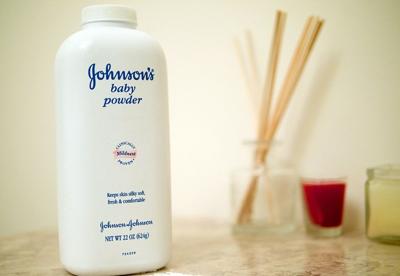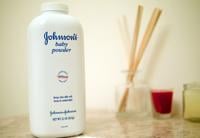
Johnson & Johnson Baby Powder no longer contains talc powder.
LOS ANGELES - Johnson & Johnson has moved swiftly to challenge a headline-grabbing $966 million talc verdict against it in Los Angeles County court, saying the verdict is the result of a "jury process gone awry."
The pharmaceutical and personal care products manufacturing giant has asked a Los Angeles County Superior Court judge to hold off on entering judgment following the trial, asserting in new court filings that the "breathtaking" verdict amount is both unconstitutional and the product of unfair proceedings.
"... These are exactly the circumstances where reservation of judgment is appropriate," Johnson & Johnson's attorneys wrote in a brief filed with the court on Oct. 10. "The Court should not enter judgment on an unconstitutional award. And there are substantial reasons to doubt the fairness of the process culminating in an unconstitutional verdict."
The filings come amid the fallout from a jury's findings that J&J should pay nearly $1 billion to the family of a woman who allegedly died of mesothelioma, allegedly caused by exposure to trace amounts of asbestos which plaintiffs claimed were in talcum used by J&J to make its baby powder products.
The verdict was entered Oct. 7 following weeks of trial in the case lodged by the family of Mae Moore. According to court documents, Moore died in 2021 at the age of 88.
In the verdict, the jury awarded Moore's family $16 million in actual damages, but tacked on $950 million in so-called punitive damages, or a payout ordered as a way of punishing a defendant for their alleged misconduct and to make an example of them.
Moore's family's lawsuit was one of thousands lodged against J&J in recent years, all claiming that the plaintiffs or their family members were exposed to asbestos within talc allegedly contained within the baby powder manufactured and sold for decades by J&J.
J&J has repeatedly claimed the lawsuits were based on "junk science." Particularly, the company has noted the 2019 study that has chiefly undergirded the legal claims contained numerous falsehoods allegedly known to the study's lead author, Dr. Jacqueline Moline, of Northwell Health.
J&J has taken legal action against Moline, accusing her of publishing allegedly false study results claiming a link between baby powder exposure and cancer, despite not noting that more than half of the subjects of her study had been exposed to asbestos through other products. Further J&J has noted many of those people had also documented those asbestos exposures in lawsuits filed against other manufacturers alleging those other products had caused them to contract mesothelioma.
Nonetheless, litigation has continued against J&J in California and elsewhere in the U.S. and the United Kingdom over claims J&J's baby powder products had allegedly caused mesothelioma.
J&J has noted it has prevailed in court in "the vast majority" of such talc cancer claims, based on the allegedly false study.
J&J baby powder products no longer use talc, as the company has transitioned to a corn starch-based product instead.
Despite the outcomes in other courts, the L.A. jury came down heavily in favor of Moore's family. They ordered J&J to pay $16 million to the family members as actual damages, and tacked on $950 million more in punitive damages.
In their new filing, J&J asserted the punitive damage amounts, particularly, are unconstitutionally large and predicted they would be overturned on appeal.
They noted the $950 million punitive damages are far out of line with the actual damages awarded and cannot stand under court precedent.
But more so, J&J argued, the case and the law should not allow for any punitive damages to be awarded at all.
They noted two California appellate courts have already ruled in similar cases that punitive damages are not permitted in such cases.
"Johnson & Johnson has already paid more than $1.5 billion in punitive damages for the same conduct," J&J wrote. "Those awards are more than sufficient to punish and deter. The State has no legitimate interest in ordering punitive damages once those goals are fulfilled, as they are here."
And J&J further argued the verdict "is likely the result of an unfair trial."
"The jury’s massive and unconstitutional award indicates serious problems in the jury’s decision making process, for no rational juror hearing the evidence could award nearly a billion dollars in punitive damages, when two California appellate courts have found no punitive damages warranted on similar facts," J&J wrote.
They further leveled potential claims of "jury misconduct" in the proceedings. They say there is evidence some jurors "may have acted in concert" to trick the court into dismissing another juror, who "informed her fellow jurors that she 'did not believe the plaintiffs proved their case.'"
J&J has asked the court to withhold entry of judgment in the case and instead set up further proceedings on its forthcoming motions to have the verdict formally tossed out and a new trial ordered.
Should the verdict be allowed to stand, J&J has already publicly pledged to appeal the verdict, which it called "egregious and unconstitutional" in public statements issued following the trial.
J&J is represented by attorneys Sabrina H. Strong and Esteban Rodriguez, of the firm of O'Melveny & Myers, of Los Angeles; and John L. Ewald, of Kirkland & Ellis, of New York.


